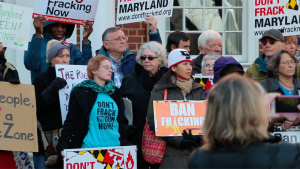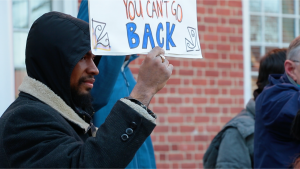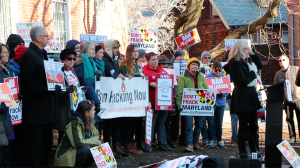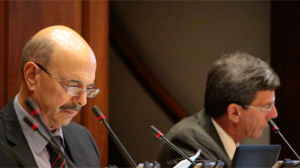Baltimore County Del. Morhaim speaks out on fracking
Opponents of hydraulic fracturing (fracking) for natural gas rally in Annapolis on Dec. 20 outside hearing of the Joint Administrative, Executive and Legislative Review Committee. (All photos by Engage Mountain Maryland)
If the Maryland legislature fails to pass a ban or an extended moratorium on the controversial practice of hydraulic fracturing for natural gas, “fracking” could commence in Garrett and Allegany Counties after October 2017.
I joined opponents and proponents of fracking who traveled to Annapolis on Dec. 20 to hear Secretary Ben Grumbles of the Maryland Department of the Environment (MDE) present the state’s proposed regulations on fracking to the Joint Administrative, Executive and Legislative Review (AELR) Committee.
I live in Baltimore County, but my wife and I also own a cabin in Western Maryland, where we have joined the fight to stop energy companies from exploiting the Marcellus Shale.
I’m a reluctant newcomer to the fight against fracking. I was a member of the Steelworkers union most of my working life and then worked for a major building trades union representing hundreds of members who labor in coal-fired power plants and on fracking projects.
I really wanted to reconcile the aspirations of my co-workers for more decent-paying union jobs with the safety, health and economic concerns of my Western Maryland neighbors. But I’ve since concluded that fracking is an inherently dangerous process and should be banned. I believe fracking would also hurt the tourism-based economy of Garrett County, putting jobs and the tax base at risk. But I still want information, perspective and context and good jobs on infrastructure and renewable energy projects for (unemployed) workers.
So, I meandered between dueling rallies on each side of the building where the hearing was to be held, talking to folks about why they were there.
 The anti-fracking rally featured members of Physicians for Social Responsibility. They warned that public health would be endangered by energy companies injecting millions of gallons of water, mixed with dozens of chemicals into pristine locations in Mountain Maryland to extract their fossil fuel bounty.
The anti-fracking rally featured members of Physicians for Social Responsibility. They warned that public health would be endangered by energy companies injecting millions of gallons of water, mixed with dozens of chemicals into pristine locations in Mountain Maryland to extract their fossil fuel bounty.
The American Petroleum Institute (API) and the Laborers International Union of North America (LIUNA) sponsored the pro-fracking rally. API speakers promoted natural gas as a cleaner energy alternative than other fossil fuels. LIUNA members, sporting the union’s orange T-shirts, chanted, “Jobs! Jobs! Jobs!”
Only a couple of the LIUNA members protesting were from Western Maryland. The vast majority of folks who traveled to Annapolis from the western counties were opposed to fracking.
 Del. Wendell Beitzel, who represents Garrett County spoke at the API rally in favor of fracking, claiming to represent the majority of residents. A recent poll refutes Beitzel’s contention. Municipalities, including Friendsville, Mountain Lake Park and Frostburg in Western Maryland have voted to ban fracking, along with Baltimore, Prince George’s, Montgomery, Anne Arundel and Frederick Counties and the cities of Baltimore, Rockville and Greenbelt.
Del. Wendell Beitzel, who represents Garrett County spoke at the API rally in favor of fracking, claiming to represent the majority of residents. A recent poll refutes Beitzel’s contention. Municipalities, including Friendsville, Mountain Lake Park and Frostburg in Western Maryland have voted to ban fracking, along with Baltimore, Prince George’s, Montgomery, Anne Arundel and Frederick Counties and the cities of Baltimore, Rockville and Greenbelt.
I took a seat inside the hearing room. Secretary Grumbles worked hard to enliven his testimony, promoting the state’s regulations as the “platinum standard” of protection, the strongest in the nation. He gave a reasonably good sales pitch. I wasn’t buying.
As soon as Grumbles finished his presentation, Northwest Baltimore County Delegate Dan Morhaim briskly challenged his testimony. Morhaim’s civil combat was like a double shot espresso.
I’m a neophyte when it comes to our leaders in Annapolis, so I Googled Morhaim. Here was a medical doctor, who graduated from Berkeley with a degree in history, went to medical school in NYC, worked on an Indian reservation in Arizona, taught at Johns Hopkins Bloomberg School of Public Health, a guy who promotes improved public health in the state, asking tough questions about the safety of fracking. Good stuff.
 Fracking opponents cheered Morhaim as he scorned the weakness of the state’s fines for energy companies who violate the state’s regulations. Morhaim went on to question if recent state budget cuts had left enough inspectors to oversee the frackers and asked if the state had studied the interactions of chemicals used in the process.
Fracking opponents cheered Morhaim as he scorned the weakness of the state’s fines for energy companies who violate the state’s regulations. Morhaim went on to question if recent state budget cuts had left enough inspectors to oversee the frackers and asked if the state had studied the interactions of chemicals used in the process.
I needed to talk to Morhaim, who, last session, introduced a bill mandating energy companies disclose the chemical compounds used in the fracking process to protect first responders and others. The bill failed.
I called the publisher of the Garrett County Republican who said he’d welcome an interview with the Baltimore County legislator.
Here are excerpts from my interview with Morhaim, one of only three practicing physicians in the House of Delegates, who also serves as the co-chair of the Alliance for Patient Access, a bi-partisan national organization of physicians elected to state office.

“Fracking is a public health chemistry experiment on an enormous scale. Chemistry is not an intuitive science. Things mix and come out in ways we don’t anticipate,” says Morhaim. Whether one is “pro” or “con” on fracking, “It’s important to have the most complete picture of the process and its effects.”
“I am an emergency room doctor and do regular shifts in the ER,” says Morhaim, who wrote a 2011 book, The Better End: Surviving (and Dying) On Your Own Terms in Today’s Modern Medical World. “I’ve worked closely with first responders and am very sensitive to what they have to do. What happens when they go to a fracking site on an emergency?” It took years, for example, for medical professionals to understand the full-blown consequences of exposure to toxins at Ground Zero on 9-11. It’s time to raise the alarm, he says, about the fossil fuel industry’s insistence on secrecy.
Currently, the names of chemicals used in the fracking process can be released only to the physician treating a patient for suspected exposure.
“This [mandate] cuts off opportunities to even discuss what doctors are learning from each other about fracking and public health,” says Morhaim. Real-life clinical studies, he says, “operate on a complex level.” Professionals need to consult with each other and compare cases. “Why would we let the energy companies keep us from bringing all our data together to protect workers and citizens?” asks Morhaim, who says he frequently calls the poison control center, which aggregates information from physicians and others, to treat his emergency room patients.
“I’m concerned that, when it comes to fracking,” says Morhaim, “the loose requirements for public participation in the decision-making process are a charade.” Companies can hear all of the objections of citizens and then go ahead with their plans “without doing anything differently.”
After the AELR Committee’s hearing, co-chairs Roger Manno (D-Montgomery) and Sandy Rosenberg (D-Baltimore City) placed a hold on the MDE’s regulations.
While advocating for the strongest possible regulations, Morhaim says he believes fracking is inherently dangerous, cannot be regulated safely, and would support a ban on the practice.
“I don’t like to predict whether any legislation will pass or fail. But in 2017 a fracking moratorium or ban will be on the General Assembly’s agenda. If one of these is not passed, then these flawed regulations will go into effect. Therefore it’s critical that citizens continue their active involvement and contact Governor Hogan and legislators with their concerns,” Morhaim says.
To learn more about fracking and how to get involved visit Engage Mountain Maryland or Citizen Shale. For more on links between organized labor and environmental activism visit Labor Network for Sustainability.

Len Shindel began working at Bethlehem Steel’s Sparrows Point Plant in 1973, where he was a union activist and elected representative in local unions of the United Steelworkers, frequently publishing newsletters about issues confronting his co-workers. His nonfiction and poetry have been published in the “Other Voices” section of the Baltimore Evening Sun, The Pearl, The Mill Hunk Herald, Pig Iron, Labor Notes and other publications. After leaving Sparrows Point in 2002, Shindel, a father of three and grandfather of seven, began working as a communication specialist for an international union based in Washington, D.C. The International Labor Communications Association frequently rewarded his writing. He retired in 2016. Today he enjoys writing, cross-country skiing, kayaking, hiking, fly-fishing, and fighting for a more peaceful, sustainable and safe world for his grandchildren and their generation. Shindel is currently working on a book about the Garrett County Roads Workers Strike of 1970 www.garrettroadstrike.com.

